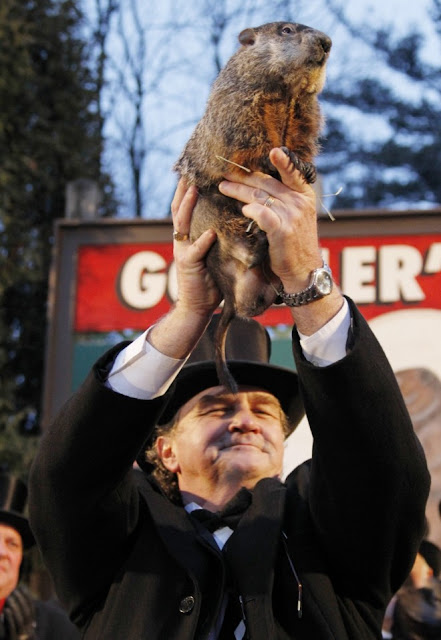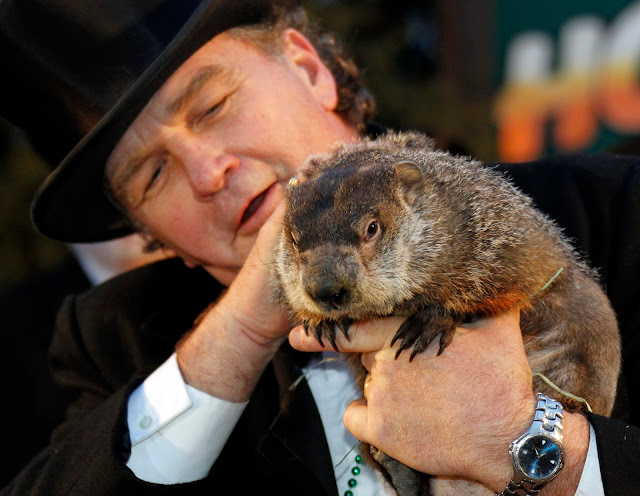***In Canada we have Wiarton Willie***
 Groundhog Day is an annual holiday celebrated on February 2. It is held
in the United States and Canada. According to folklore, if a groundhog
emerging from its burrow on this day fails to see its shadow, it will
leave the burrow, signifying that winter will soon end. If on the other
hand, the groundhog sees its shadow, the groundhog will supposedly
retreat into its burrow, and winter will continue for six more weeks.
Groundhog Day is an annual holiday celebrated on February 2. It is held
in the United States and Canada. According to folklore, if a groundhog
emerging from its burrow on this day fails to see its shadow, it will
leave the burrow, signifying that winter will soon end. If on the other
hand, the groundhog sees its shadow, the groundhog will supposedly
retreat into its burrow, and winter will continue for six more weeks.
 The holiday, which began as a Pennsylvania German custom in
southeastern and central Pennsylvania in the 18th and 19th centuries,
has its origins in ancient European weather lore, wherein a badger or
sacred bear is the prognosticator as opposed to a groundhog. The holiday
also bears some similarities to the medieval Catholic holiday of
Candlemas. It also bears similarities to the Pagan festival of Imbolc,
the seasonal turning point of the Celtic calendar, which is celebrated
on February 2 and also involves weather prognostication.
The holiday, which began as a Pennsylvania German custom in
southeastern and central Pennsylvania in the 18th and 19th centuries,
has its origins in ancient European weather lore, wherein a badger or
sacred bear is the prognosticator as opposed to a groundhog. The holiday
also bears some similarities to the medieval Catholic holiday of
Candlemas. It also bears similarities to the Pagan festival of Imbolc,
the seasonal turning point of the Celtic calendar, which is celebrated
on February 2 and also involves weather prognostication.
 Modern customs of the holiday involve celebrations where early morning
festivals are held to watch the groundhog emerging from its burrow. In
southeastern Pennsylvania, Groundhog Lodges (Grundsow Lodges) celebrate
the holiday with fersommlinge, social events in which food is served,
speeches are made, and one or more g'spiel (plays or skits) are
performed for entertainment. The Pennsylvania German dialect is the only
language spoken at the event, and those who speak English pay a
penalty, usually in the form of a nickel, dime or quarter, per word
spoken, put into a bowl in the center of the table.
Modern customs of the holiday involve celebrations where early morning
festivals are held to watch the groundhog emerging from its burrow. In
southeastern Pennsylvania, Groundhog Lodges (Grundsow Lodges) celebrate
the holiday with fersommlinge, social events in which food is served,
speeches are made, and one or more g'spiel (plays or skits) are
performed for entertainment. The Pennsylvania German dialect is the only
language spoken at the event, and those who speak English pay a
penalty, usually in the form of a nickel, dime or quarter, per word
spoken, put into a bowl in the center of the table.
 The largest Groundhog Day celebration is held in Punxsutawney,
Pennsylvania, where crowds as high as 40,000 have gathered to celebrate
the holiday since at least 1886. Other celebrations of note in
Pennsylvania take place in Quarryville in Lancaster County, the
Anthracite Region of Schuylkill County, the Sinnamahoning Valley and
Bucks County. Outside of Pennsylvania, notable celebrations occur in the
Frederick and Hagerstown areas of Maryland, the Shenandoah Valley of
Virginia, Woodstock, Illinois, and among the Amish populations of over
twenty states and Canada. The University of Dallas in Irving,Texas has
taken Groundhog Day as its official university holiday and organizes a
large-scale celebration every year in honor of the Groundhog.
The largest Groundhog Day celebration is held in Punxsutawney,
Pennsylvania, where crowds as high as 40,000 have gathered to celebrate
the holiday since at least 1886. Other celebrations of note in
Pennsylvania take place in Quarryville in Lancaster County, the
Anthracite Region of Schuylkill County, the Sinnamahoning Valley and
Bucks County. Outside of Pennsylvania, notable celebrations occur in the
Frederick and Hagerstown areas of Maryland, the Shenandoah Valley of
Virginia, Woodstock, Illinois, and among the Amish populations of over
twenty states and Canada. The University of Dallas in Irving,Texas has
taken Groundhog Day as its official university holiday and organizes a
large-scale celebration every year in honor of the Groundhog.
 Groundhog Day received worldwide attention as a result of the 1993 film
of the same name, Groundhog Day, which was set in Punxsutawney (though
filmed primarily in Woodstock, Illinois) and featured Punxsutawney Phil.
Groundhog Day received worldwide attention as a result of the 1993 film
of the same name, Groundhog Day, which was set in Punxsutawney (though
filmed primarily in Woodstock, Illinois) and featured Punxsutawney Phil.
 |
| PUNXSUTAWNEY PHIL THE GROUNDHOG |
 Groundhog Day is an annual holiday celebrated on February 2. It is held
in the United States and Canada. According to folklore, if a groundhog
emerging from its burrow on this day fails to see its shadow, it will
leave the burrow, signifying that winter will soon end. If on the other
hand, the groundhog sees its shadow, the groundhog will supposedly
retreat into its burrow, and winter will continue for six more weeks.
Groundhog Day is an annual holiday celebrated on February 2. It is held
in the United States and Canada. According to folklore, if a groundhog
emerging from its burrow on this day fails to see its shadow, it will
leave the burrow, signifying that winter will soon end. If on the other
hand, the groundhog sees its shadow, the groundhog will supposedly
retreat into its burrow, and winter will continue for six more weeks. The holiday, which began as a Pennsylvania German custom in
southeastern and central Pennsylvania in the 18th and 19th centuries,
has its origins in ancient European weather lore, wherein a badger or
sacred bear is the prognosticator as opposed to a groundhog. The holiday
also bears some similarities to the medieval Catholic holiday of
Candlemas. It also bears similarities to the Pagan festival of Imbolc,
the seasonal turning point of the Celtic calendar, which is celebrated
on February 2 and also involves weather prognostication.
The holiday, which began as a Pennsylvania German custom in
southeastern and central Pennsylvania in the 18th and 19th centuries,
has its origins in ancient European weather lore, wherein a badger or
sacred bear is the prognosticator as opposed to a groundhog. The holiday
also bears some similarities to the medieval Catholic holiday of
Candlemas. It also bears similarities to the Pagan festival of Imbolc,
the seasonal turning point of the Celtic calendar, which is celebrated
on February 2 and also involves weather prognostication. Modern customs of the holiday involve celebrations where early morning
festivals are held to watch the groundhog emerging from its burrow. In
southeastern Pennsylvania, Groundhog Lodges (Grundsow Lodges) celebrate
the holiday with fersommlinge, social events in which food is served,
speeches are made, and one or more g'spiel (plays or skits) are
performed for entertainment. The Pennsylvania German dialect is the only
language spoken at the event, and those who speak English pay a
penalty, usually in the form of a nickel, dime or quarter, per word
spoken, put into a bowl in the center of the table.
Modern customs of the holiday involve celebrations where early morning
festivals are held to watch the groundhog emerging from its burrow. In
southeastern Pennsylvania, Groundhog Lodges (Grundsow Lodges) celebrate
the holiday with fersommlinge, social events in which food is served,
speeches are made, and one or more g'spiel (plays or skits) are
performed for entertainment. The Pennsylvania German dialect is the only
language spoken at the event, and those who speak English pay a
penalty, usually in the form of a nickel, dime or quarter, per word
spoken, put into a bowl in the center of the table. |
| PUNXSUTAWNEY PHIL THE GROUNDHOG |
 The largest Groundhog Day celebration is held in Punxsutawney,
Pennsylvania, where crowds as high as 40,000 have gathered to celebrate
the holiday since at least 1886. Other celebrations of note in
Pennsylvania take place in Quarryville in Lancaster County, the
Anthracite Region of Schuylkill County, the Sinnamahoning Valley and
Bucks County. Outside of Pennsylvania, notable celebrations occur in the
Frederick and Hagerstown areas of Maryland, the Shenandoah Valley of
Virginia, Woodstock, Illinois, and among the Amish populations of over
twenty states and Canada. The University of Dallas in Irving,Texas has
taken Groundhog Day as its official university holiday and organizes a
large-scale celebration every year in honor of the Groundhog.
The largest Groundhog Day celebration is held in Punxsutawney,
Pennsylvania, where crowds as high as 40,000 have gathered to celebrate
the holiday since at least 1886. Other celebrations of note in
Pennsylvania take place in Quarryville in Lancaster County, the
Anthracite Region of Schuylkill County, the Sinnamahoning Valley and
Bucks County. Outside of Pennsylvania, notable celebrations occur in the
Frederick and Hagerstown areas of Maryland, the Shenandoah Valley of
Virginia, Woodstock, Illinois, and among the Amish populations of over
twenty states and Canada. The University of Dallas in Irving,Texas has
taken Groundhog Day as its official university holiday and organizes a
large-scale celebration every year in honor of the Groundhog. Groundhog Day received worldwide attention as a result of the 1993 film
of the same name, Groundhog Day, which was set in Punxsutawney (though
filmed primarily in Woodstock, Illinois) and featured Punxsutawney Phil.
Groundhog Day received worldwide attention as a result of the 1993 film
of the same name, Groundhog Day, which was set in Punxsutawney (though
filmed primarily in Woodstock, Illinois) and featured Punxsutawney Phil.*Wikipedia

No comments:
Post a Comment